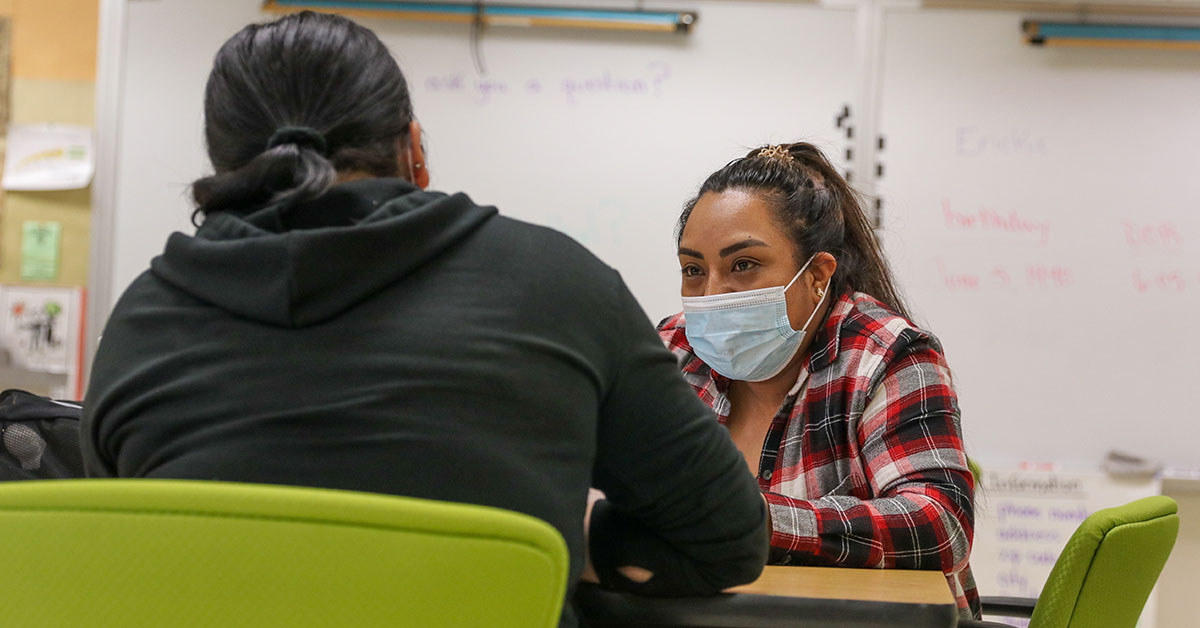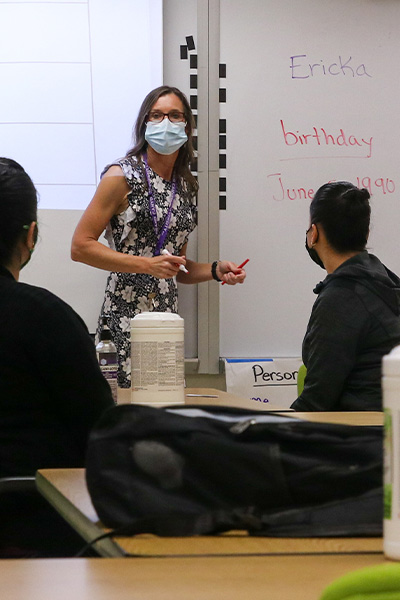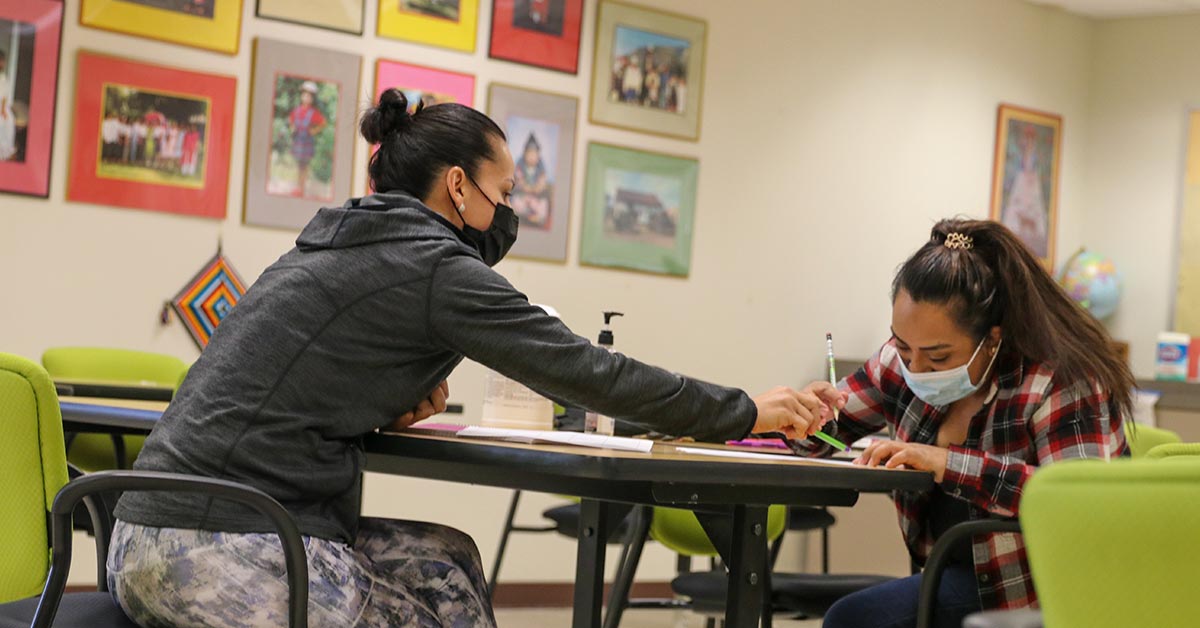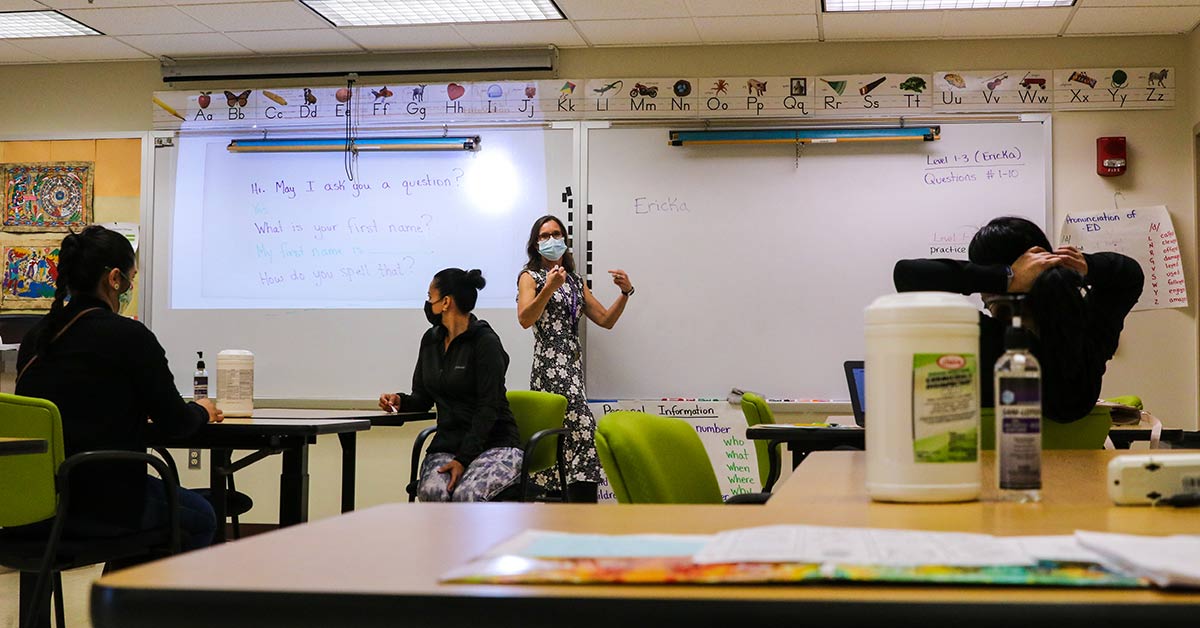When Ana Gavris first arrived in the Yakima Valley, she didn’t speak any English. Born in Romania, she learned Spanish after marrying and moving to Valencia, Spain, with her husband.
After a new job opportunity for Gavris’ husband brought the couple to the Yakima Valley in July 2019, learning English was a priority.
“When I went in the store, people [would] ask me questions and I wouldn’t understand,” Gavris said. “I was looking for a place where I could learn English.”
Yakima Valley College soon came to her attention and by September Gavris was taking English Language Acquisition (ELA) classes.
“The classes have helped me so much because the teachers are so good,” she says. “For a job I need to learn English, and also to learn to speak better so it’s easier to talk with my neighbors or people in the store.”
Since starting classes at YVC, Gavris’ confidence has grown in everyday interactions with people.
“I feel more comfortable because I see something and I have an answer for people,” she said. “When I need to ask something, I feel better about it.”
“[English language learners] have so much to share and so much to give, so much knowledge, and having that voice empowers them to become a more integral part of our community.”
— Ericka Tollefson, English Language Acquisition Instructor

While Yakima Valley College has long offered high-quality, affordable instruction to those looking to improve their English language abilities, the onset of the COVID pandemic required its ELA instructors to quickly adapt to offering classes remotely for the first time.
ELA Instructor Ericka Tollefson said faculty began meeting with students synchronously via Zoom for every class session in order to maintain real-time interaction with students.
“We’ve also really learned to use breakout room [in Zoom] so we still have a lot of small group activities,” Tollefson said. “The students are interacting with each other as we teach listening, speaking, reading, writing and digital literacy skills.”
Tollefson said she and other instructors incorporated other apps such as Jamboard — a digital whiteboard that allows multiple people to pull in images and write in a collaborative space — to add another layer to students’ learning.
The college also made changes in how it on-boards new ELA students.
Tollefson said new students get at least two personal phone calls as part of the registration process along with one-on-one advising. The college also provides a technology orientation session for new students to help them learn to navigate Zoom and Canvas, YVC’s online learning system.
“It helps ELA students hit the ground running,” said Marc Coomer, dean for College and Career Readiness and the Grandview Campus.
 ELA classes are offered virtually and on YVC's Grandview and Yakima campuses. Ericka
Tollefson is shown teaching here on the Yakima Campus.
ELA classes are offered virtually and on YVC's Grandview and Yakima campuses. Ericka
Tollefson is shown teaching here on the Yakima Campus.In addition, the college has provided numerous ELA students with laptops and hotspots at no charge so that technology and internet access don’t present a barrier to community members who want to improve their English. YVC Technology Services staff also are available to help provide support.
Coomer said all of those adaptations and supports help further the ultimate mission of the college’s ELA program to empower community members to reach their education and career goals and improve their lives. He noted that a significant number of ELA students have gone on to complete their GED or diploma, and then enrolled in and graduated from YVC’s degree and certificate programs.
“Everyone should have as much opportunity as possible,” Coomer said. “For students to have the opportunity to earn their diploma or GED, or to learn to speak English, opens so many doors for them. We want to always be increasing those opportunities.”
One way instructors support that is by asking each ELA student what their goals are when they start taking classes.
“Students get to choose some of what they study,” Tollefson said. “We teach English within a context that students are interested in.”
For example, if a student previously worked in a medical profession in their native country and wanted to continue in that career, instructors tailor what that student learns to match their goal. As students enter upper-level ELA classes, they get additional individual advising on academic programs available at YVC and other institutions.
“It’s about me helping you get where you want to go,” Tollefson said. “I think it makes a huge impact for our community that students are able to get the degrees or the certificates to move into areas where we really need skilled workers and have shortages.”
“Seeing more languages represented in the classroom creates a richness that’s just exhilarating.”
— Ericka Tollefson
One important discovery over the past year and a half, Coomer and Tollefson said, is that offering both in-person and remote class options is a way to better serve those seeking to learn English in the Yakima Valley.
Reynalda Flores of Yakima started taking ELA classes in 2018 and this fall is among those students taking advantage of the option for in-person instruction resuming.
“I need more English for job opportunities, for medical appointments, for my children in school,” said Flores.
She noted that taking English classes has already paid off in many ways, such as helping her talk with a supervisor who didn’t speak Spanish, and she’s committed to continuing to improve her skills.
“My confidence has grown,” Flores said.

Another recent trend seen at YVC has been an influx of ELA students with a greater diversity of native languages and education levels. While Spanish-speaking students continue to make up the majority of ELA students at YVC, more students are entering with their native tongue being Vietnamese, Korean, Chinese, Portuguese, French, Russian, German, Ukrainian and Quicha, among others.
“Seeing more languages represented in the classroom creates a richness that’s just exhilarating,” Tollefson said. “I’m also seeing a lot more students who are coming in with advanced degrees from their native countries. That also creates just an incredible amount of richness in the experience that students bring to the classroom and are able to share.”
When students speak a variety of first languages, everyone benefits.
“It forces everyone to do everything in English, which is exactly what I want,” she said. “So, the more diversity, I think students’ progress is actually faster.”
Ultimately, adding English proficiency to the other skills ELA students possess will benefit the entire Yakima Valley, Tollefson said.
“They have so much to share and so much to give, so much knowledge, and having that voice empowers them to become a more integral part of our community,” Tollefson said. “I want people to have their voice. I want them to be seen and to be heard, and to feel how valued they are.”
